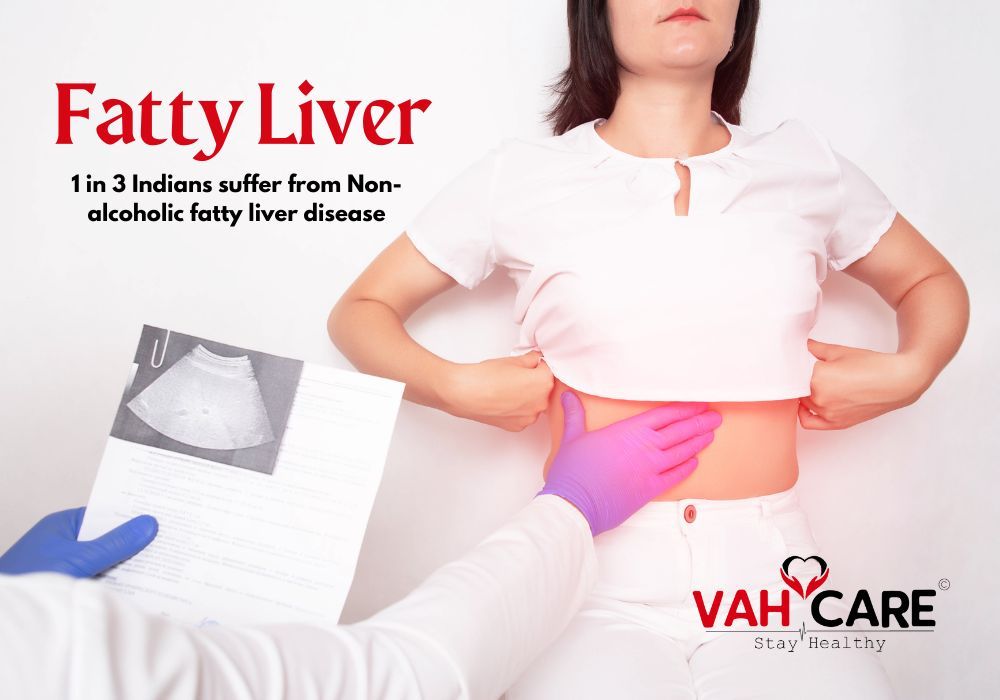
Unveiling the Silent Epidemic: Navigating Fatty Liver – Causes, Symptoms, and Solutions

Fatty liver!! 1 in 3 Indians suffer from Non-alcoholic fatty liver disease! Nearly 38% indians have some or the other stage of Non alcoholic fatty liver disease.
As the name suggests, fatty liver is when there is excess fat built up in the liver. Some amount of fat in the liver is natural and required. But, if the fat weight exceeds about 5% of the liver weight, it is considered to be a fatty liver.
🔸Types of fatty liver
There are two main types:
1️⃣ Nonalcoholic fatty liver disease (NAFLD)
2️⃣ Alcoholic fatty liver disease, also called alcoholic steatohepatitis
🔸Alcoholic fatty liver
Drinking large amounts of alcohol, even for a few
days can lead to increased fat buildup in the liver.
The liver is where all the alcohol we consume is
metabolized, hence maximum damage happens
here. It is the 1st stage of alcohol-realted liver damage.
🔸Non-alcoholic fatty liver disease (NAFLD)
NAFLD is a type of fatty liver disease that is not related to heavy alcohol use
1️⃣ NAFLD,in which u have fat in ur liver but little/no inflammation/liver cell damage,recently renamed as metabolic-dysfunction related fatty liver disease
2️⃣ Nonalcoholic steatohepatitis (NASH)
The severe form of NAFLD is called NASH or non-alcoholic steatohepatitis in which there is fat deposition, inflammation as well as scarring in the liver.
Risk factors for NAFLD
🔹Overweight/obesity
🔹A high waist to hip ratio
Ideal- for Men: ≤0.90
For women: ≤0.85
🔹Insulin resistance
🔹Type 2 diabetes
🔹Dyslipidemia
🔹Metabolic syndrome (presence of diabetes, high lipid levels, hypothyroidism, high uric acid)
Other risk factors👇
🔹Genetic history
🔹Sedentary lifestyle
🔹Consumption of processed foods
🔹Stress
🔹Smoking
🔹Erratic Sleep Schedule
🔹Heavy metal toxicity like mercury&lead
are surprisingly common. These come
through food,breathing in industrial areas
🔹Certain medication
🔸Tracking the progress
If you have ticked more than 3 of the above causes, you might be at risk.
Get Your blood work done as well as a sonography along with Fibroscan
Blood tests👇
🔹Fasting Insulin
🔹HbA1c
🔹FBS
🔹GGT
🔹Lipid profile
🔹SGPT/OT
🔹ESR
🔹hs-CRP
🔸Why has it become so common?
The reason is our sedentary lifestyle. Our food is more processed.
Sleep schedules are not in sync with circadian rhythm, &we are putting in more toxins through pollution, food additive , coupled with ⬆️prevalence of IR, type 2 diabetes, obesity
🔸Dietary and lifestyle changes to manage fatty liver👇
🔹 Eliminate/avoid Sugar-sweetened beverages and fructose-containing processed foods.
▪️For example: sauces & condiments, fruit juices, cold drink, packaged sweets- cup cakes, pastries, cookies, biscuits, chocolates
▪️Sugar switches on fat production in liver, creating an internal process called lipogenesis, which is body’s normal response to sugar.
Fructose, sugar that heads directly to liver, actually ramps up lipogenesis.
▪️Excess sugar and starch creates more serious problems including high triglycerides, low HDL, and high amounts of small LDL cholesterol .
▪️So, reduce ur fructose intake - avoid fruit platters, fruit juices (even if it's home made without sugar).
▪️Restrict the number of fruit to 1-2 small fruit/day.
▪️Eliminate all high-fructose corn syrup (HFCS).
🔹Maintain a Healthy Weight
If you're overweight or obese, try to reduce your weight in a healthy way.
Losing even a small percentage of your body weight can significantly reduce fat in the liver. Depending on your level of fatty liver recommendations could be 3-5%/as much as 10%
🔹Keep diabetes, hypertension, & hyperlipidemia under control, get regular checkups &use medication, if required
A combination of diabetes, hypertension &dyslipidemia can contribute towards fatty liver, so managing the blood sugar, triglyceride &HDL level would be very important!
🔹A calorie deficit, Low carb, high protein and high fat diet balanced with good amount of vegetables - is mainstay in managing fatty liver.
When you go low-carb, you also need to make sure that you balance it out with quality proteins and fats.
🔹Add healthy fats
Avoid hydrogenated oils, vegetable oils, soyabean oil. Instead of these refined oils u can use healthier cooking option like cold pressed coconut oil, mustard oil, ghee &olive oil Fatty fish rich in omega 3 fatty acid - sardine, mackerel, salmon can be included
🔹Eat more fibre
Increasing fibre intake improves the gut microbiota, which reduces liver damage and inflammation.
Fibre-rich meals also help with portion control, thereby supporting healthy fat loss.
🔹Avoid refined flour products
Refined flour foods-croissants, khari, rusk, breads, biscuits, cakes. They cause spike in blood glucose levels, leading to increased fat buildup in the liver
🔹Include Garlic, it contains a compound-Allicin that reduces inflammation in the liver
🔹Include cruciferous vegetables like- Cauliflower, broccoli, cabbage This family of vegetables contain sulphur compounds that play an important role in the detoxification process in the liver.
They also contain "Indole" a compound that is known to reduce inflammation in liver
🔹Black coffee, black and green tea are excellent for the liver since they contain antioxidants & polyphenols.
Coffee intake has been shown to reduce fatty liver disease. Ideally, it is black coffee, no sugar, no milk, a minimum of 2 cups/day, complete intake before late evening
🔹 Routine daily exercise
improves insulin resistance and reduces fatty liver. Start with something as simple as walking for 30min/day
Exercise they has benefits on fatty liver - aerobic exercise, resistance training & high- intensity interval training
🔹Sleep:
Quality sleep is imp for body to repair. 7-8hrs of sleep is imp to allow the cells to regenerate &heal. Toxins produced by the liver r then effectively removed.
Poor sleep has been linked to obesity, insulin resistance& inflammation factors they can exacerbate NAFLD
🔹 Manage Stress
stress can have significant impact on liver health. when we experience stress, the body releases stress hormone-cortisol which can effect liver function
Cortisol release may be linked to insulin resistance and inflammation, which could⬆️ the amount of fat stored in the liver cells



